As an experienced workers compensation lawyer, you didn’t dedicate your career just to watch potential clients slip through your fingers because they couldn’t find you online. Without effective workers compensation lawyer SEO, even the most qualified attorneys struggle to attract work injury cases in today’s digital landscape.
Yet that’s exactly what’s happening to countless firms right now. Over 93% of online experiences begin with a search engine, and 68% of all website traffic comes from organic search. As AI-powered search platforms increasingly serve direct answers instead of links, digital invisibility means your expertise remains hidden from the very people who need it most.
In this definitive guide, we’ll unveil the proven SEO strategies that successful workers’ compensation attorneys are using to dominate search results, attract quality cases, and build thriving practices – all while navigating the new AI-first search landscape that’s reshaping legal marketing.

Why Workers Comp Law Firm Marketing is Essential for Practice Growth
Imagine this: A warehouse employee is injured on the job and urgently needs legal help. They search online for a workers’ compensation attorney. In that critical moment, the firm they find is the one they call. If your firm isn’t visible in that search, you’ve lost a potential client — not because of your skills or experience, but because your competitor invested in being found online.
The Statistics That Should Wake You Up
- 70% of people begin their search for an attorney online
- 58% of law firms admit lack of marketing effort hurts their market performance
- Nearly 69% of all clicks go to the top three organic search results, underscoring the importance of strong SEO.
If your firm isn’t visible when these injured workers search, you simply don’t exist in their world. But there’s more to this story…
SEO Isn’t Just About Rankings – It’s About Being Available When People Need You Most
Effective SEO transforms your workers’ compensation practice by:
- Placing your firm directly in front of injured workers at their moment of greatest need
- Establishing your credibility before a potential client ever speaks with you
- Creating a consistent flow of qualified workers compensation leads without endless ad spending
- Highlighting your expertise in specific workplace injuries or industry specialties
AI Has Completely Transformed Legal Search
The way we search has changed forever, and AI for lawyers is part of that evolution—systems like Google SGE, Bing AI, and ChatGPT now deliver AI-generated answers instantly, no scrolling required.
For workers’ compensation attorneys, this revolution means traditional SEO tactics are no longer sufficient. These AI platforms evaluate content for structure, clarity, expertise, and trustworthiness to determine which firms deserve placement in their summarized results.
The sobering reality? Even if you’re the most experienced workers’ compensation attorney in your state with decades of successful cases, if your digital presence isn’t optimized for both traditional and AI search, you might as well be invisible to potential clients.
1. Crafting a Comprehensive SEO Strategy
Before diving into optimization tactics, you need a strategic roadmap that aligns with your specific practice goals. An effective search engine optimization strategy for workers’ compensation isn’t just about higher search engine rankings – it’s about attracting the right cases that maximize your firm’s strengths and profitability. Here are the foundational steps:
Define Measurable Goals and Performance Metrics
Establish concrete web design goals before launching any optimization efforts:
- Are you targeting higher-value cases in specific industries where injuries are most prevalent (like construction, which accounts for 22% of workplace fatalities)?
- Do you want to increase consultation requests or direct phone inquiries (considering 68% of clients make initial contact by phone)?
- Is your goal to expand into neighboring jurisdictions or capture more market share locally?
- Which specific workplace injury types should you target based on recent trends (overexertion, mental health claims, repetitive strain injuries)?
Decode Your Potential Clients’ Search Patterns
Next, understand the actual language injured workers use when seeking legal help:
- What immediate questions arise after a workplace injury?
- What specific terms do they use when researching workers’ compensation benefits?
- What fears or concerns drive them to seek legal representation?
Utilize platforms such as Bing Webmaster Tools, AlsoAsked, and advanced AI analytics to uncover genuine search behaviors and the intent driving them.
Conduct Strategic Competitor Analysis
With goals defined and client behavior understood, examine the firms currently dominating workers’ compensation searches in your region:
- What specific injury types or industries do they highlight?
- How do they structure their workers’ compensation content?
- What client questions are they addressing that you’re not?
Platforms such as Similarweb, Serpstat, and Ubersuggest offer valuable insights into your competitors’ top-performing content, backlink profiles, and keyword tactics with remarkable accuracy.
Advanced Tip: Use AI tools like ChatGPT or Claude to generate detailed outlines for your workers’ compensation pages based on top-ranking competitor content—then enhance those outlines with your unique insights, case studies, or local expertise to create more valuable, authoritative pages.
For instance, if competing firms lack detailed content on “repetitive stress injuries in manufacturing jobs” but you specialize in these cases, that’s a strategic opportunity to showcase your unique expertise.
Center your strategy around addressing the genuine concerns of injured workers – not just optimizing for algorithms. When you directly solve their problems and answer their pressing questions, improved rankings naturally follow.
2. In-Depth Keyword Research and Analysis
The foundation of effective SEO lies in understanding precisely what your potential clients are searching for. Strategic keyword research isn’t a technical checkbox – it’s about aligning your content with the actual questions and urgent needs injured workers have when seeking legal representation.
Consider this reality: organic search drives 66% of call conversions in the legal industry according to Ruler Analytics, and according to recent studies, personal injury lawyers who invest in SEO generate 6.5 times more leads than those who don’t. Local search has become particularly crucial, with 64% of people turning to Google first when seeking legal help.
Prioritize High-Intent, Location-Specific Keywords
Understanding the difference between keywords is where keyword research for lawyers becomes essential. While “workers’ compensation claim process” indicates general interest, “experienced workers’ comp attorney in Boston” reflects a serious intent to hire.
Focus on phrases like:
- “Workers’ compensation lawyer in [city/county]”
- “Denied workers’ comp claim attorney near me”
- “Best lawyer for workplace back injury”
- “[Industry]-specific injury attorney” (e.g., “construction fall injury lawyer”)
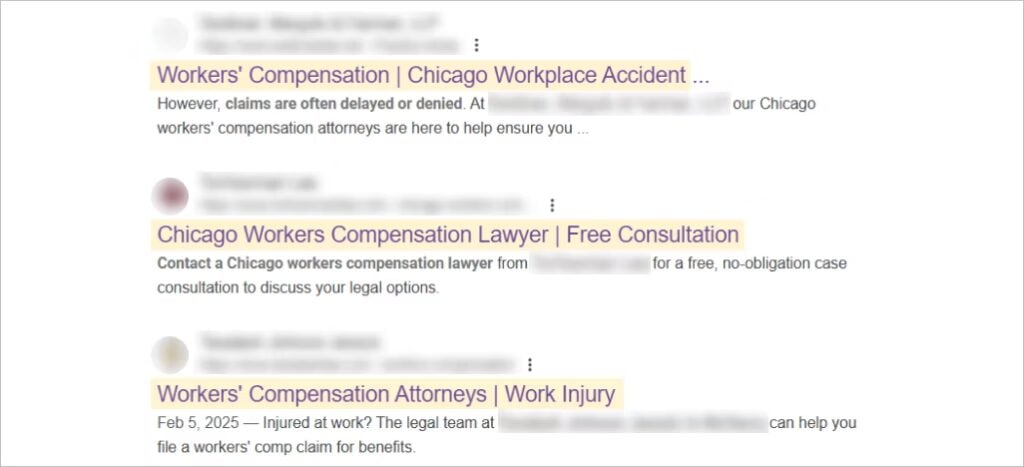
Leverage Professional Tools and Client Insights
Eliminate guesswork with data-backed SEO insights using these powerful tools:
- Ubersuggest for keyword discovery and trend analysis
- Moz Pro for in-depth competitor research and domain authority insights
- AlsoAsked to uncover real user questions and search intent
- Bing Webmaster Tools to identify and optimize your existing ranking opportunities
Insider Tip: Analyze the questions and concerns clients raise during initial consultations—these often mirror the exact keywords and phrases potential clients type into search engines when looking for legal help.
Target Strategic Niches Rather Than Overcrowded Terms
Highly generic terms like “workers comp attorney” face extreme competition. Instead, focus on specialized long-tail keywords that match specific client situations:
- “Can I choose my own doctor for workers comp injury in [state]”
- “Workers compensation for carpal tunnel syndrome”
- “Maximum compensation for permanent disability claim”
AI Advantage: Use legal AI tools to generate comprehensive question clusters based on injury types or industries. Try prompting: “Generate 10 specific questions someone might search after suffering a back injury at a construction site before contacting a workers’ comp attorney in [state].” This quickly uncovers highly specific search terms with lower competition but strong conversion potential.
The most valuable workers’ compensation cases often begin with highly specific searches that align with your particular expertise. By targeting these precise keywords, you’ll attract clients with legitimate claims who specifically need your specialized knowledge.
3. Optimizing On-Page SEO Elements for Better Visibility
Even if you’re the top workers’ compensation attorney in your region, failing to optimize for Google ranking factors for lawyers, such as proper site structure and title clarity, can cause search engines to ignore your site—along with the clients who need you most.
On-page optimization serves as the critical foundation of your digital visibility. It helps search engines understand your specialization while showing potential clients why your firm is uniquely qualified to handle their workplace injury case.
Craft Compelling Titles and Descriptions That Drive Clicks
Your title tag creates your critical first impression in search engine results pages.
Avoid generic titles like “Workers Compensation | Johnson Law Firm.”
Instead, implement: “Augusta Workers’ Compensation Attorney | 25+ Years Fighting for Injured Workers | Johnson Law”
Follow with a meta description that addresses pain points and offers clear value: “Denied benefits after a workplace injury? Our Augusta workers’ comp specialists have recovered $50M+ for injured workers. Free consultation – no recovery, no fee.”
Maintain titles under 60 characters and meta descriptions under 160 characters to ensure proper display across devices.
Structure Content With Strategic Headers
Organize your content into easily navigable sections using properly nested header tags:
- H1: Experienced Workers’ Compensation Lawyer in Denver
- H2: How Our Firm Helps After a Workplace Injury
- H3: Understanding Your Rights to Medical Treatment

Designed with law firm SEO in mind, this hierarchy increases readability and keyword relevance, helping injured workers find quick answers despite pain and stress.
Implement Strategic Internal Linking
Guide visitors through your site with purposeful internal links that support both user navigation and SEO value:
- Connect your main “Workers’ Compensation” page to specific injury pages like “Repetitive Strain Injuries” or “Construction Accidents”
- Link relevant FAQ answers to your consultation request page
- Create pathways between related blog content and your core service pages
Develop Clean, Keyword-Rich URLs
Avoid: /practice-areas/workers-compensation-claims-and-benefits-section-2b
Use: /workers-compensation-lawyer-atlanta
AI Efficiency: Leverage AI tools to generate optimized titles, meta descriptions, and header suggestions for your key pages. Always review these suggestions for accuracy, tone, and compliance with legal advertising regulations in your jurisdiction.
By strategically optimizing these on-page elements specifically for workers’ compensation topics, you signal to both search engines and potential clients that your firm offers specialized, authoritative guidance in this practice area.
4. Creating High-Quality, Engaging Content
If your site fails to speak directly to the real concerns of injured workers, you’re not only hurting your search rankings—you’re damaging credibility, and that’s where content marketing for lawyers becomes critical.
Today’s workers’ compensation clients conduct extensive research before making contact with an attorney. If your content doesn’t directly answer their urgent questions, they’ll quickly move to a competitor who provides the clarity they seek.
Create a Workers Compensation Marketing Content Strategy
Approach content development as creating a strategic pathway that guides injured workers from initial research to becoming clients. Build content that addresses each stage of their journey:
- Awareness: “Signs your employer is mishandling your workplace injury claim”
- Consideration: “How much is my workers’ compensation case worth in [state]?”
- Decision: “Questions to ask before hiring a workers’ compensation attorney”
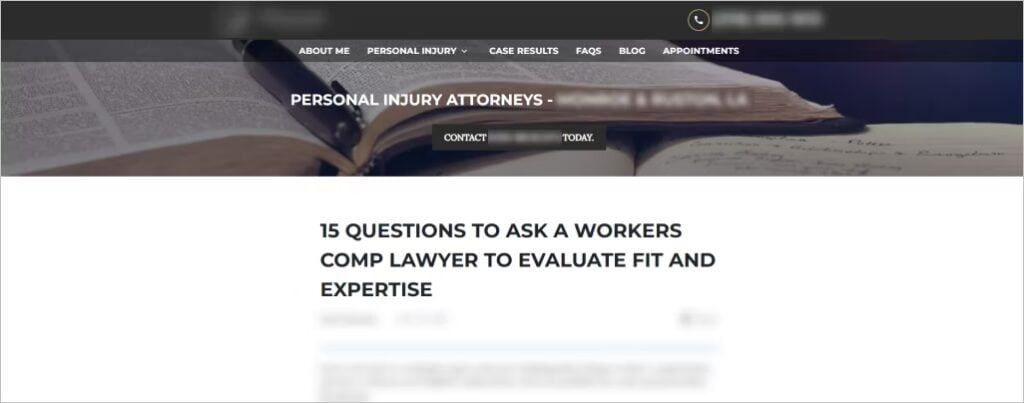
Is this comprehensive approach worth the investment? Absolutely. Research shows that 66% of potential legal clients thoroughly research their situation online before contacting an attorney.
Develop Tailored Pages for Each Practice Area
Don’t settle for a generic overview. Every workers’ compensation case type—whether it’s a repetitive stress injury or a fall from height—warrants its focused landing page.
Why does this matter? Because injured workers search with precision. Someone looking for a “repetitive strain injury lawyer in Chicago” isn’t interested in a general guide—they want detailed answers that speak directly to their situation. To attract these clients and convert traffic into consultations, your pages should:
- Use localized keywords in the title, headers, and URL (e.g., /carpal-tunnel-workers-comp-lawyer-chicago)
- Speak directly to the unique concerns tied to that injury type
- Highlight your credentials, successful outcomes, and client testimonials
- End with a strong, time-sensitive call to action (“Get your free case evaluation within 24 hours”)
Leverage Your Blog as an Authority-Building Tool
When blogging for lawyers, a blog that generates qualified leads consistently should focus on:
- Breaking down complex workers’ compensation laws into plain language
- Providing industry-specific guidance (healthcare, manufacturing, construction)
- Creating step-by-step guides for navigating the claims process
- Addressing common reasons for claim denials and appeal strategies
The data confirms this approach works: law firms that publish regular, high-quality content generate 53% more consultations than those without consistent content strategies.
Showcase Results Through Strategic Case Studies
To demonstrate your effectiveness and persuade potential clients, develop structured case studies:
- Situation: “Manufacturing worker suffered shoulder injury requiring surgery”
- Challenge: “Employer disputed work-relatedness of injury”
- Approach: “Gathered expert medical testimony and workplace evidence”
- Outcome: “$225K settlement plus lifetime medical benefits”
Important: Always prioritize factual precision in workers’ compensation content. Reference applicable state laws where relevant, and ensure content reflects real legal expertise. While AI tools can streamline drafting, human review by a qualified attorney is crucial for maintaining compliance, credibility, and alignment with Google’s E-E-A-T principles.
By creating content that truly addresses the needs and concerns of workers dealing with on-the-job injuries, you’ll not only enhance your search visibility but also position your firm as the authoritative choice when they’re ready to take legal action.
5. Building a Strong and Natural Link Profile
Backlinks – inbound links from external websites to your firm’s site – remain one of the most influential ranking factors in Google’s algorithm. For workers’ compensation attorneys, strategic link building is fundamentally about establishing credibility and demonstrating expertise in workplace injury law.
When authoritative, relevant sites link to your content, you gain trust signals that boost your rankings while building confidence with potential clients researching their options after a workplace injury.
Focus on Industry-Specific, High-Authority Link Sources
Focus on securing backlinks from reputable sources in the legal, workplace safety, and industry-specific sectors, rather than generic or irrelevant websites. Valuable link building for lawyers can be achieved through these opportunities:
- Legal directories such as Avvo, Justia, FindLaw, and Martindale-Hubbell
- State and local bar associations and workers’ compensation specialty groups
- Occupational safety organizations and industry trade associations
- Local chambers of commerce and business resource networks
- News outlets featuring your expert commentary on workers’ compensation developments
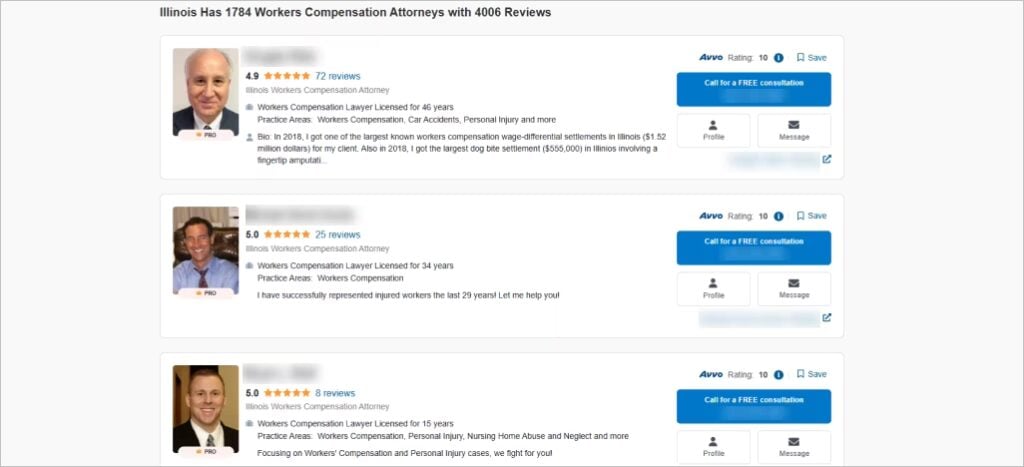
Websites that secure backlinks from respected legal and industry-specific sources often dominate search rankings for competitive terms like “workers compensation attorney,” especially in localized searches. Earning links from authoritative platforms signals trustworthiness and relevance, which search engines reward with stronger visibility.
Develop a Strategic Guest Content Program
Creating high-value guest content for respected legal publications, safety journals, or industry resources does more than generate links – it establishes you as a recognized authority in workers’ compensation law.
Develop content pitches addressing workplace safety trends, legislative changes, or injury prevention strategies, ensuring each published piece contains a contextually relevant link to your site’s specialized content.
Avoid Manipulative Link Practices
Purchasing backlinks, participating in link schemes, or overusing exact-match anchor text (like “best workers comp lawyer”) triggers Google penalties and undermines your credibility. Focus exclusively on earning legitimate, editorially-given links through valuable content and relationship building.
Leverage AI for Strategic Link Prospecting
AI tools can analyze your competitors’ link profiles and identify untapped opportunities specific to workers’ compensation. They can also monitor the web for brand mentions that lack hyperlinks – providing easy opportunities to request proper attribution with a link. In the context of AI marketing for lawyers, this can significantly boost your online presence.
Remember that in workers’ compensation SEO, link quality dramatically outweighs quantity. A single link from a respected state bar association or occupational safety organization carries more weight than dozens of links from irrelevant or low-quality sources.
By methodically building a diverse, authoritative link profile, you signal to search engines that your firm is a recognized leader in workers’ compensation law – driving both improved rankings and enhanced client trust.
6. Local SEO for Stronger Regional Rankings
When someone searches for a workers comp lawyer and your firm doesn’t appear in the top 3 local results, you’re missing out on valuable work injury lawyer leads – making your workers comp attorney advertising ineffective. This isn’t hyperbole – 27% of law firms now recognize Google Business Profile as a key channel for brand awareness according to recent research, and with good reason: these prominent local listings often receive the majority of clicks.
Local SEO for lawyers is paramount, considering that workers’ compensation rates and regulations differ state by state, with many expecting rate reductions in 2025. These regional variations highlight the need to focus on local targeting to engage with injured workers within your practice area. Here’s how to achieve visibility in local search:
Optimize Your Google Business Profile for Maximum Visibility
Your Google Business Profile is like a digital storefront, allowing prospective clients to find your legal services online. Ensure it’s fully verified and optimized with:
- Precise name, address, and phone number (NAP) information
- Specific primary category (“Workers’ Compensation Attorney”) with relevant secondary categories
- Comprehensive business description highlighting your workers’ comp specialization and experience
- High-quality photos of your team, office exterior/interior, and professional credentials
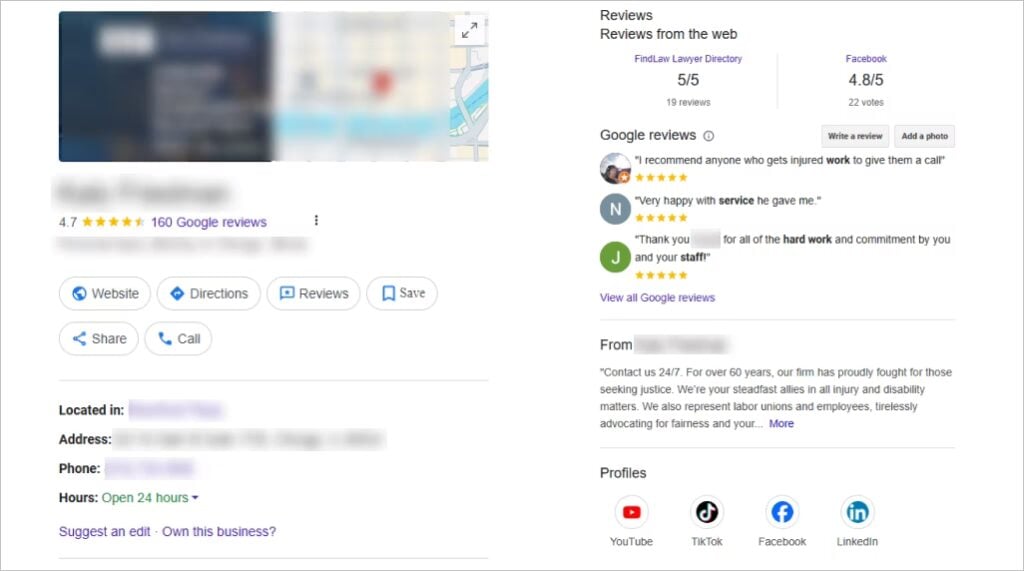
Consistently publish Google Posts featuring client success stories, workers’ comp law updates, or firm news to demonstrate activity and reinforce your specialization.
Build a Consistent Citation Network
Establish your firm’s presence with consistent NAP formatting across all legal directories and local directory platforms:
- Legal directories: Avvo, Justia, FindLaw, Lawyers.com, SuperLawyers
- Local listings: Yelp, Better Business Bureau, Apple Maps, Bing Places
- Industry-specific: State bar association, workers’ compensation specialty groups, safety organizations
This consistent presence not only improves your rankings but ensures injured workers can find your firm regardless of which platform they use in their search.
Develop a Strategic Review Generation Program
Recent studies show that 53% of potential legal clients consider reviews critically important when selecting an attorney. For workers’ compensation practices, positive reviews from former clients carry exceptional weight.
Implement a systematic approach to ethically encourage satisfied clients to share their experiences on your Google Business Profile, legal directories, and social platforms. Respond thoughtfully to every review – positive or negative – demonstrating your attentiveness and professionalism to both existing and prospective clients.
Create Hyper-Localized Content Assets
Generic content won’t rank for location-specific searches. Develop content that explicitly reflects your practice locations:
- City-specific service pages (“Workers’ Compensation Attorney in Sacramento”)
- County or state-specific workers’ comp claim guides
- Individual location pages for multi-office firms with local testimonials and directions
- Content addressing prominent industries and common workplace injuries in your geographic area
In the competitive field of workers’ compensation law, these local SEO elements create a powerful competitive advantage. Master these tactics, and you’ll not only outrank nearby competitors – you’ll become the definitive choice for injured workers throughout your service region.
7. Optimizing Technical SEO for Better Performance
Even the most valuable workers’ compensation insights can go unnoticed if your website struggles with slow load times, poor mobile responsiveness, or crawlability issues. These behind-the-scenes technical flaws can quietly bury your content where no one will find it.
Technical SEO forms the backbone of your online presence—but for many workers’ compensation firms, it remains the most underutilized tool in their digital strategy.
Site Speed: A Non-Negotiable Ranking Factor
A shocking 49% of law firms report mobile optimization as a major challenge according to CallRail research. This is particularly problematic since recent data shows 53% of mobile users abandon websites that take more than 3 seconds to load – and injured workers are far more likely to search on mobile devices while in distress. Optimize speed through:
- Professional image compression and optimization
- Core Web Vitals optimization (Google’s critical ranking factors)
- Implementation of Accelerated Mobile Pages (AMP) for key landing pages
- Content delivery networks (CDNs) to improve global load times
- Regular site speed audits with tools like Google PageSpeed Insights
Mobile Optimization: Essential for Injured Worker Searches
Over 63% of workers’ compensation-related searches now occur on mobile devices. Someone who’s been injured on the job is far more likely to search for help on their smartphone than wait until they can access a computer. Ensure your site:
- Loads quickly across all device types
- Presents responsive, properly-scaled content
- Features touch-friendly navigation and buttons
- Maintains easily accessible contact forms and click-to-call functionality
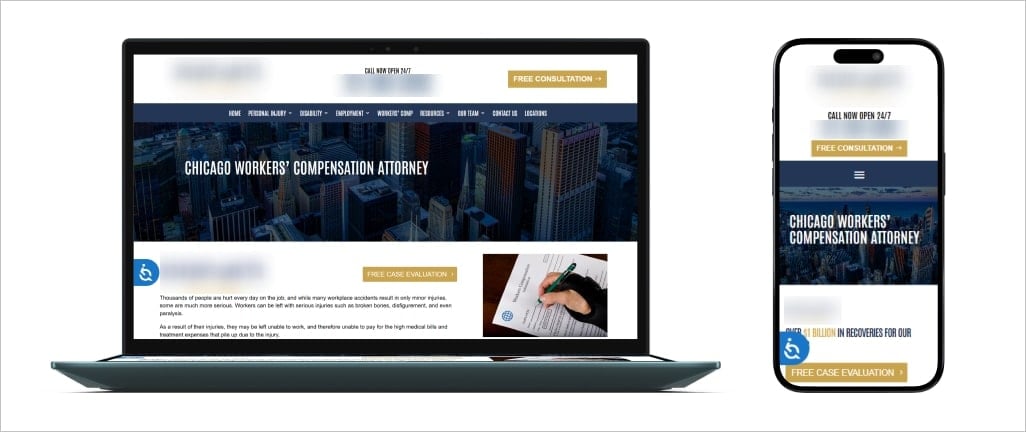
Implement Strategic Schema Markup for Workers’ Comp Attorneys
Schema markup (structured data) helps search engines understand and showcase your firm’s information directly in search results. For workers’ compensation attorneys, implement:
- LocalBusiness and Attorney schema types with specialization details
- FAQPage schema for workers’ compensation questions and answers
- Review schema highlighting positive client outcomes
- ProfessionalService schema with workers’ comp practice details
This structured data increases your visibility in search results and improves your chances of appearing in featured snippets and knowledge panels for workers’ compensation queries.
Resolve Crawl and Indexation Barriers
If search engines can’t easily access and understand your content, even the most helpful workers’ compensation resources won’t make it to the top. To improve your chances of ranking, make sure your site’s structure is clear and logical, submit an updated XML sitemap to Google Search Console, link relevant pages to each other, and address any duplicate content or broken links. These simple steps will make it easier for search engines to find your content and help you rank higher.
Professional Tip: Conduct a comprehensive technical SEO audit using tools like SEMrush, Ahrefs, or Screaming Frog. These platforms can identify critical technical issues affecting your search performance – allowing you to address the highest-impact problems first.
By strengthening your technical SEO foundation, you remove the invisible barriers preventing your workers’ compensation expertise from reaching the injured workers who desperately need your guidance and representation.
8. Analytics and Measurement: Data-Driven Optimization
Alarming research shows that 65% of lawyers don’t know which metrics to measure in their marketing campaigns. Another study found that in 32% of law firms, only one lawyer has access to their website analytics. Without robust tracking and analysis of your SEO performance, you’re essentially operating blindfolded – potentially squandering resources on strategies that fail to deliver quality workers’ compensation cases to your practice.
Implement Comprehensive Analytics Infrastructure
Begin with the fundamental tracking systems: Google Search Console and GA4 for law firms, but also consider specialized legal analytics platforms that track client acquisition costs specifically for workers’ compensation cases. These platforms reveal crucial insights about how injured workers discover your site, which keywords generate quality traffic, and where potential clients abandon the conversion process. Without this data foundation, you cannot make informed marketing decisions.
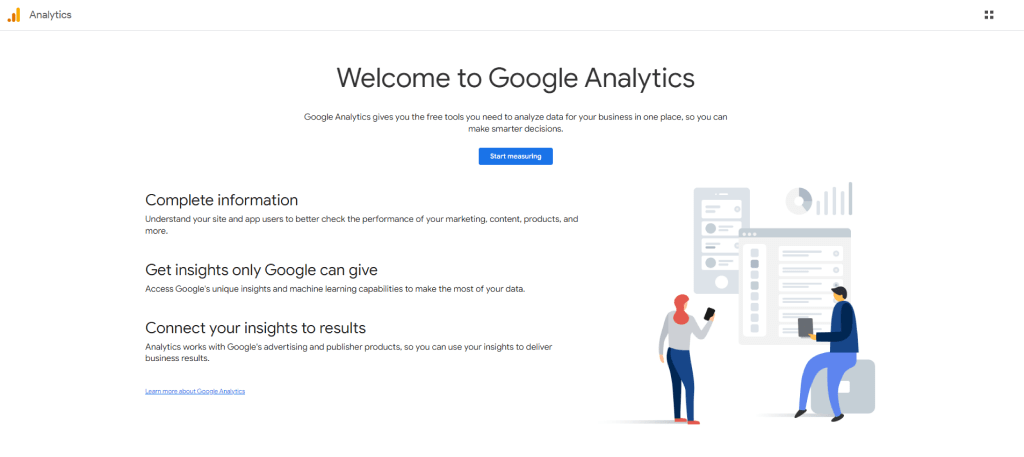
Monitor the Metrics That Drive Case Acquisition
Avoid fixating on vanity metrics like raw traffic numbers. For workers’ compensation attorneys, these key performance indicators directly impact your practice growth:
- Organic traffic segmented by geographical service areas
- Click-through rates for workers’ comp-related search terms
- Engagement metrics (bounce rate, pages per session, time on site) for injury-specific content
- Consultation requests and phone calls attributed to organic search
- Keyword rankings for priority injury types, industries, and locations
These metrics provide clear visibility into not just your search presence, but how effectively your digital assets convert visitors into potential clients with viable workplace injury claims.
Transform Data into Strategic Direction
Monthly performance analysis should translate numbers into actionable insights. Which content resonates most with injured workers? What keywords are driving qualified consultations? Where do competitors maintain advantages? Use these insights to continuously refine your content strategy, site architecture, and keyword targeting.
Forecast Trends and Opportunities
Advanced analytics tools can transform historical data into predictive insights for workers’ compensation searches. These tools identify emerging patterns – such as seasonal fluctuations in specific workplace injuries, changing search behaviors, or new keyword opportunities – enabling you to adapt your strategy proactively rather than reactively.
When you measure the metrics that directly impact your workers’ compensation practice growth, you can make data-driven decisions that maximize your marketing ROI and consistently attract your ideal clients.
Conclusion: Transform Your Workers’ Compensation Expertise Into Market Dominance
At Comrade Digital Marketing, we specialize in helping workers’ compensation attorneys turn legal expertise into consistent lead generation and long-term growth. With a successful SEO strategy, your firm can appear exactly where and when injured workers are looking for representation.
Instead of letting competitors dominate the search results, take control of your online presence and connect with more clients who need your help. Our results-driven SEO services focus on increasing your visibility, building brand credibility, and generating qualified leads naturally.
Let’s put your firm in front of the right audience at the right time. Contact us today to schedule your free SEO consultation and start attracting the cases your practice deserves. Google prioritizes mobile-responsive sites in its search results, so ensuring that your website is optimized for various devices is essential. This includes having a responsive design, fast loading times, and easy navigation tailored for mobile users.
Frequently Asked Questions
-
How long does it take to see results from SEO efforts?
SEO is a long-term strategy, and most law firm SEO campaigns take between 3 to 6 months to show noticeable improvement. Factors like website age, competition level, and the consistency of optimization efforts all impact timelines. Implementing local SEO strategies can speed up visibility for location-specific searches. Patience and regular monitoring are key to lasting success.
-
Should you hire an SEO expert or agency?
Hiring an SEO expert or agency is often worthwhile, especially if you’re unfamiliar with tools like Google Keyword Planner or lack time to manage optimization. Professionals can craft strategies tailored to your legal services and ensure compliance with best practices. They also help integrate social media marketing with your SEO plan for broader reach. Ultimately, their expertise can provide a strong return on investment.
-
What are some common SEO mistakes to avoid for law firms?
One major mistake is neglecting to optimize for relevant keywords that your target audience actually searches for. Another is creating thin or duplicate content, which can hurt your content marketing efforts. Workers compensation law firms should also avoid generic strategies and instead focus on workers comp lawyer marketing for niche-specific results. Lastly, ignoring mobile optimization and local search visibility can limit potential client engagement.
